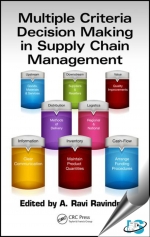Tab Article
Supply chain management decisions are made under the conflicting criteria of maximizing profit and customer responsiveness while minimizing supply chain risk. Multiple Criteria Decision Making in Supply Chain Management provides a comprehensive overview of multi-criteria optimization models and methods that can be used in supply chain decision making.
Presenting the contributions of internationally known authors, researchers, educators, and practitioners, this new book in the Operations Research Series provides readers with a single source guide to recent developments in this area. Starting with an introduction to supply chain management (SCM) and to multiple criteria decision making (MCDM), this book:
- Covers transportation issues and supply chain inventory decisions in detail
- Presents multiple criteria mathematical programming models for optimizing decisions regarding the number and location of supply chain facilities and determining optimal distribution strategies
- Discusses the supplier selection models under multiple conflicting criteria
- Incorporates supply chain risk as an objective function for designing resilient global supply chains
The focus of the book is on the design and operation of the supply chain system, which involves connecting many production and distribution systems, often across wide geographic distances, in such a way that the businesses involved can ultimately satisfy the consumer demand as efficiently as possible, resulting in maximum financial returns to those businesses connected to that supply chain system. The book includes several case studies on the design and operation of supply chain networks in manufacturing and healthcare.


